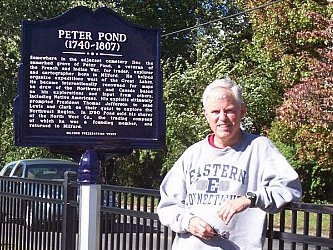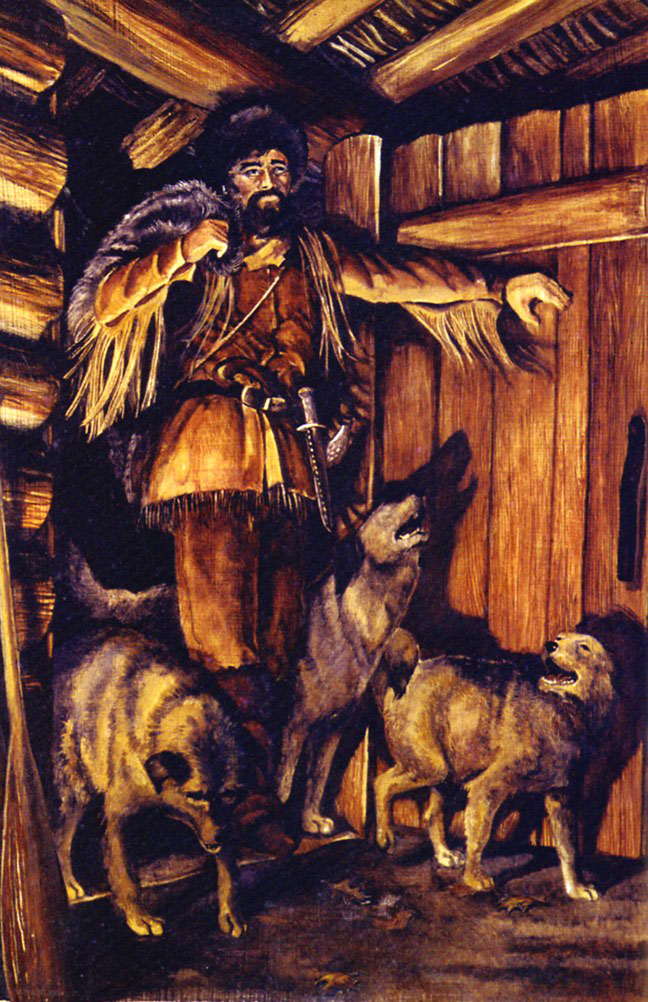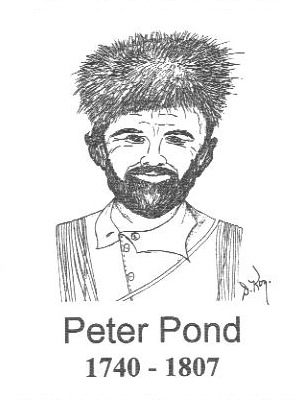Peter Pond newsletter :: November 2013 :: #42
PETER POND BOOKS
Greetings:
As we await publication of the first full-length book on Peter Pond since 1930, I have learned Peter Pond has been discussed in other works that have recently been published or are about to be. As reported in Peter Pond Society 41 May 2012, the major forthcoming publication is by David Chapin with the title "Freshwater Passages: The Trade and Travels of Peter Pond," set to come out July 1, 2014 from University of Nebraska Press. Pre-orders are now being taken for $50 from UNP) and $45 from
Amazon.
Published in August was "t:Harold Innis and the North: Appraisals on Contestations" edited by William J. Buxton, a compendium of essays dealing with Peter Pond's original biographer. A noted Canadian economist who died in 1952, he turned to discussing the philosophy of communication later in his career drawing many disciples which included Marshal McLuhan. Following publication of his "Fur Trade in Canada" he chose to write about Peter Pond as a way to humanize the industry that existed in the 18th and 19th centuries there. So it should come as no surprise that one of the essays in the book is entitled "Harold Innis, Peter Pond and the Fur Trade" by Paul Heyer.
PPS MEMBER ON PBS WAR OF THE WORLDS DOCUMENTARY
Paul, a professor of communications at Wilfrid Laurier University, Waterloo, Ontario, has been a Peter Pond Society member for several years. If you happened to see the PBS TV program Oct. 30 commemorating the 75th anniversary of Orson Welles' famous terrifying radio broadcast of "War of the Worlds," you would have seen Paul as one of the commentators. You will see in his website) that a lifelong fascination with radio has led to his latest book on Welles' radio legacy and how his use of sound in radio influenced his motion pictures. But Paul is an Innis disciple too.
When I emailed Paul asking if that was him in the PBS program, he said yes and also told me about the Buxton book in which he had an article on Peter Pond. On doing an interlibrary loan search I found that Yale University was the only place in Connecticut that had it, but not for circulation. Since I have reading privileges at Yale's Sterling Library, which is only a half hour away, I went up and read the chapter. I later found the whole book along with the chapter can be read on Google Books). Just before Heyer's chapter is one written by another Peter Pond Society member, none other than Barry Gough, retired Laurier history professor who's book cover on Alexander Mackenzie ("First Across the Continent") graces the top of my Peter Pond Society website. His chapter in the Buxton book is entitled "Innis and North Canada: Fur Trade and Nation" which in this case does not discuss Peter Pond.
But at the end of the Heyer chapter are two footnote annotations on Peter Pond which mention Peter Pond Society. Footnote 4 refers to a quotation in an article on Peter Pond by western exploration author John C. Jackson, another Peter Pond Society member, that appeared in Peter Pond Society Newsletter 30, May 2007. Entitled "Peter Pond's Map," the quote is in the second paragraph saying Alexander Mackenzie was an "ungrateful apprentice who stole Peter's vision of continental geography and greedily claimed the King's honors for proving it." That of course refers to the fact, of which Innis concurs, that Mackenzie gleaned all of his western exploration knowledge from Peter Pond on replacing him at Athabasca fort then reached the Pacific 12 years before Lewis and Clark, wrote a best-selling book on the expedition and was knighted by King George III, while Peter Pond died in poverty.
Footnote 5 states: "Recent Pond scholarship includes a forthcoming biography by David Chapin, part of which I was able to see thanks of Bill Macdonald of the Peter Pond Society. Peter Pond Society Newsletter (2007b)." I don't know of any such arrangement between Chapin and Heyer, but it's nice that Peter Pond Society and I get attention in such a scholarly work. The only time Chapin is mentioned in 2007 is Peter Pond Society 27 in February which announces he is researching his Peter Pond book.
It's also mentioned in the Heyer chapter that Jackson has a forthcoming book on western exploration in North America that features a chapter on Peter Pond. I contacted John C. and he sent me the excerpt of how Peter Pond is "briefly treated" in his "The Northwest Company Columbia Adventure" introduction. Here it is:
A party to the 1784 agreement was the Milford, Connecticut fur trader Peter Pond. His previous experience on the middle Saskatchewan River introduced Indian descriptions of great mountains to the west and a river they called the Naberkistagon that ran down to the western sea. Pond had an inquiring mind and a visionary interest in geography, but he understood that the bonanza fur trade was to the north. There was a persistent but unproven myth of a "northwest passage by water" to the Pacific Ocean. At his post on Lake Athabaska, Peter Pond gathered information regarding the lay of the land to the north and west.
Pond was aware of the North Pacific explorations of the English mariner, Captain James Cook, and came to believe that Cook's charts indicated a river flowing into an inlet on the south Alaska coast. Because the outlet from Great Slave Lake and Turnagain Arm of Cook's Inlet were about the same latitude, they must be the same river. The long sought-after Northwest Passage must finally be at hand. Athabaska furs could be sent down the relatively short route of Cook's River to an entrepôt at the river's mouth and reshipped from there to the markets of China.
After 1787 Pond shared responsibility for the North West Company trade in the Athabaska department with an ambitious clerk named Alexander Mackenzie. Soon after his arrival at the fort on Athabaska River, Mackenzie absorbed Pond's ideas regarding the northern geography and began forming some "distant intentions" of his own. But his first exploration to find a commercially feasible line of communication with China was a dead end to the Arctic Ocean.
On May 9, 1793 Mackenzie, his clerk Alexander McKay and eight voyageurs set out in a twenty-five foot canoe in search of a freshwater "Northwest Passage" through the northern Rocky Mountains. After crossing the water divide, Mackenzie came upon a large river flowing southward that local Indians called the Tacoutche or Tacoutche Tesse (present Fraser River). The boat party soon found it too dangerous to descend.
Returning upstream Mackenzie and his men took a cross-country route to the coastal home of the Bella Coola Indians, finally reaching salt water in a promising district for trading. Mackenzie marked his accomplishment with a sign painted in vermillion and grease on a rock that proclaimed, "Alexander Mackenzie from Canada, by land, the twenty-second of July, One thousand seven hundred and ninety-three."
But it was another impossible route and the explorer believed that his explorations proved there was no useful navigation by water, or land for that matter, across the top of the North American continent. Despite Pond's speculations and Mackenzie's two voyages to confirm it, results failed to reveal a practicable water route for British traders to the Pacific. The promising new region beyond the Rocky Mountains (soon to be known as New Caledonia) lay even more distant from Montreal and the markets of Europe. And there was now a problem of national sovereignty.
A full year previous to Mackenzie's crossing by land, a new drainage had already been discovered. On May 12, 1792 the Boston coastal trading ship Columbia Rediviva had entered an unexplored river. According to tradition of discovery, the experienced sea otter trader Captain Robert Gray claimed all the drainage of the Columbia River for the United States.
And to think that all of this newsletter was prompted by my happening to catch that "War of the Worlds" show on PBS.

Au revoir,
Bill
website design by Daniel Ortoleva

